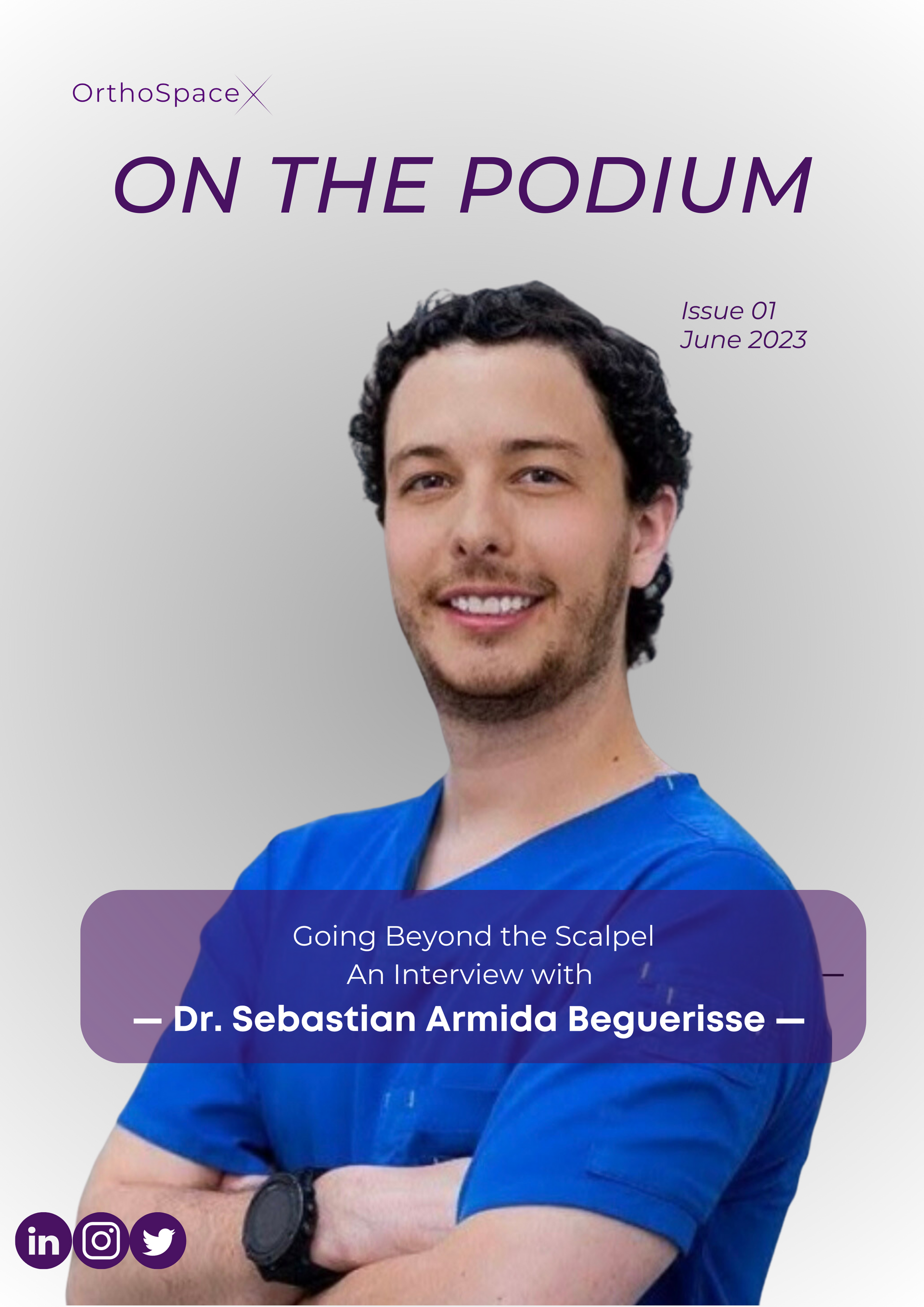Forging a career path in upper limb orthopaedics:
Shoulder2Wrist
- Mr. Sam Vollans -
Issue 02, July 2023
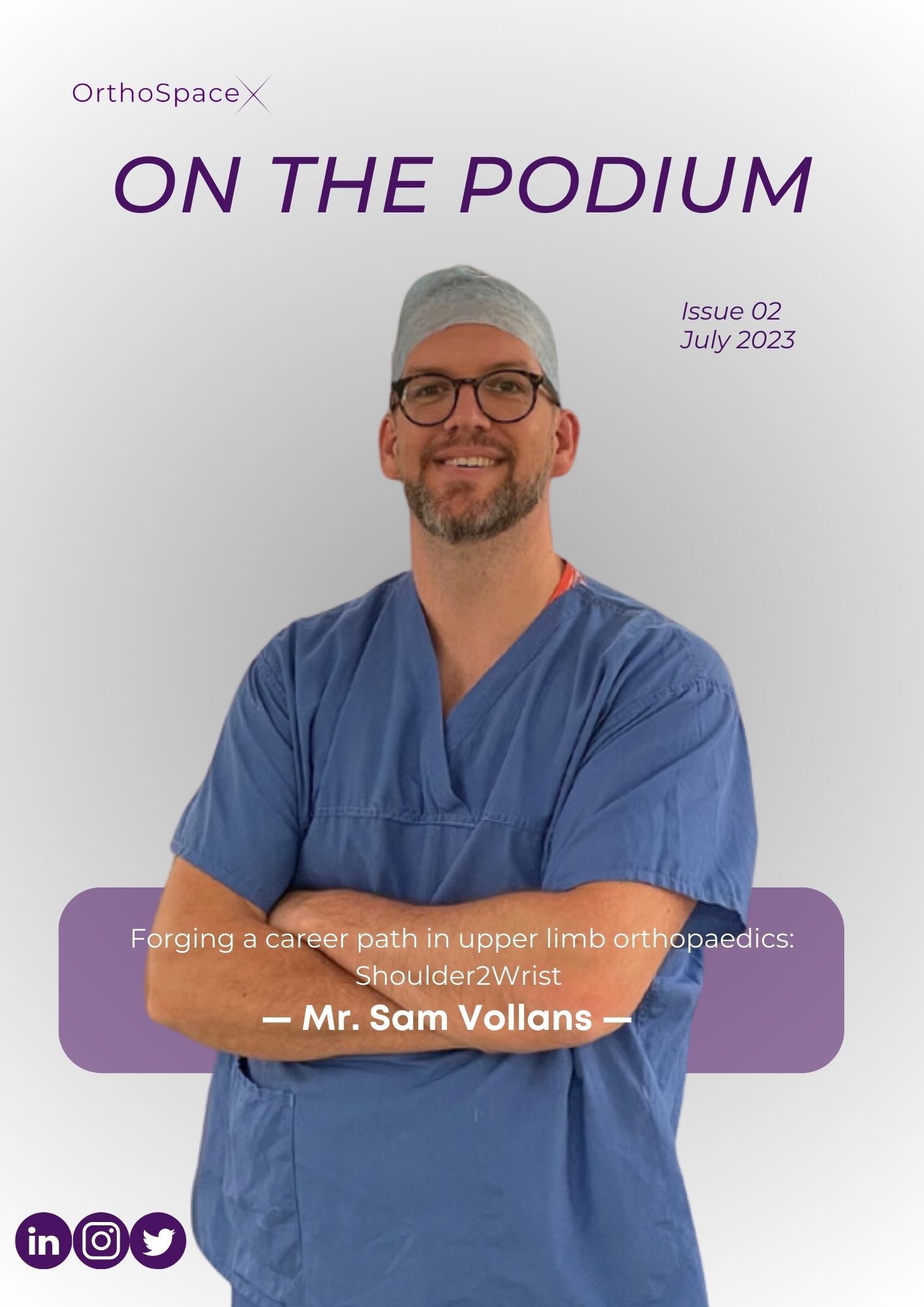
Can you walk us through your career path and how you became interested in orthopaedic surgery?
Well, being from a completely nonmedical family, I was always interested in building things, and my first experience of doing that was building a rally go-kart during my GCSEs. I really liked welding and hammering and drilling and fixing things...…. making things work and work well. I wondered whether becoming a doctor was a good thing for me, as I enjoyed science, and I liked the idea that I could maybe make people better. I arranged some work experience with a friend of the family; I was only 15 at the time so I wasn’t allowed to go into theatre to watch surgery, but while I was in accident and emergency a doctor tapped me on the shoulder and said, “come with me!” He took me into theatre, and I watched a hip replacement – there were drills, hammers, cement, saws… it was heaven. I remember going home to speak to my dad, and I said to him that I wanted to do that as my job. He then worked out what A-levels I needed to do, what degree I needed to do, and ultimately my career into something called orthopaedic surgery!
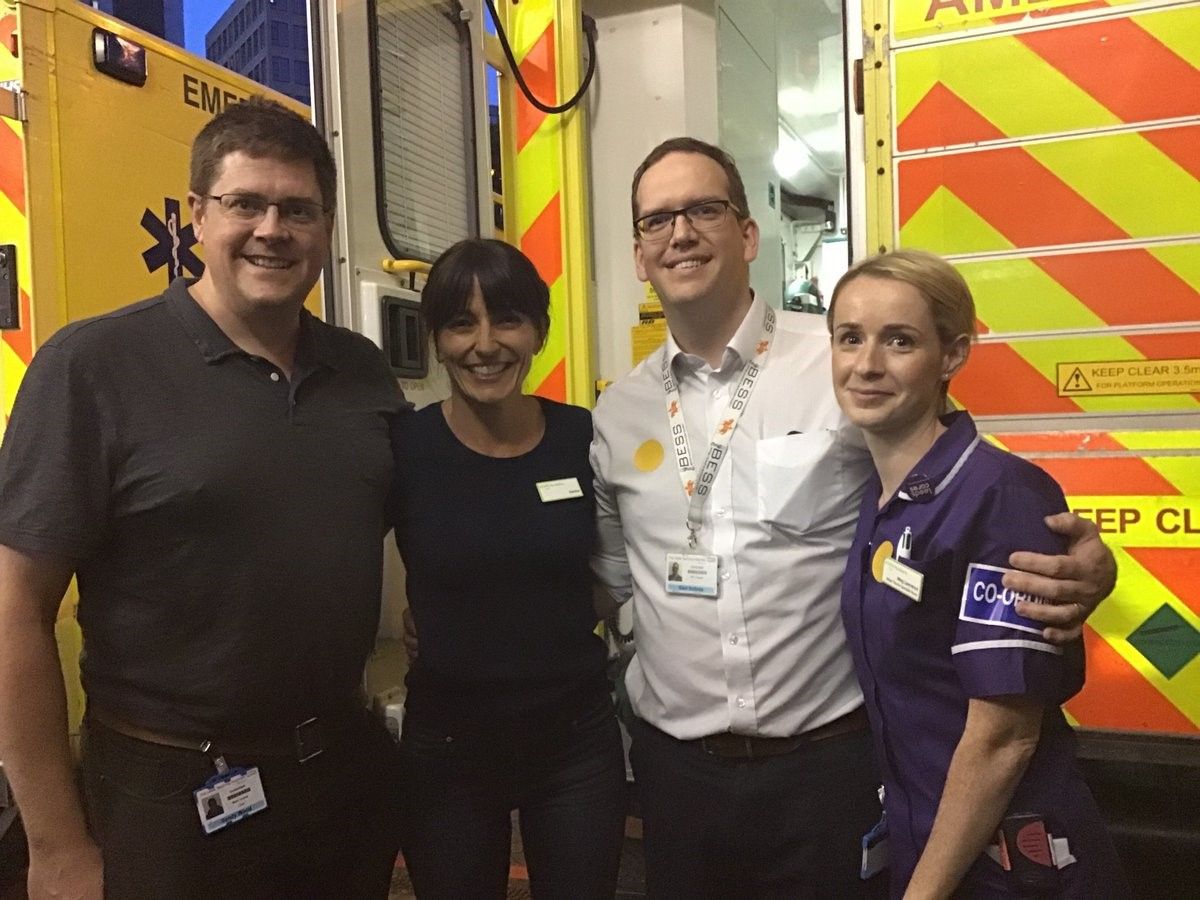
What motivated you to specialise in shoulder & elbow surgery?
So I started my medical school training at Leeds University, knowing that I wanted to do orthopaedics, I went to meet the senior lecturer in orthopaedics at the time who was David Limb, who was a shoulder and elbow surgeon. I used to go and spend time with him in clinic on a Friday and learned a lot about shoulder and elbow surgery. I also performed a couple of course work pieces throughout my medical school degree in topics related to shoulder and elbow. I think his influence on me as a role model had a profound effect on me in choosing shoulder and elbow surgery. Throughout my orthopaedic training, I was struck by the amount of day case surgery and low inpatient volume of the surgeons that I worked with and that was another big positive for me. I also loved the huge variety of surgery within the upper limb, in contrast to lower limb arthroplasty for example. Though I have not lost my love of a big hammer, I enjoy the slightly more refined aspects of surgery on the upper limb.
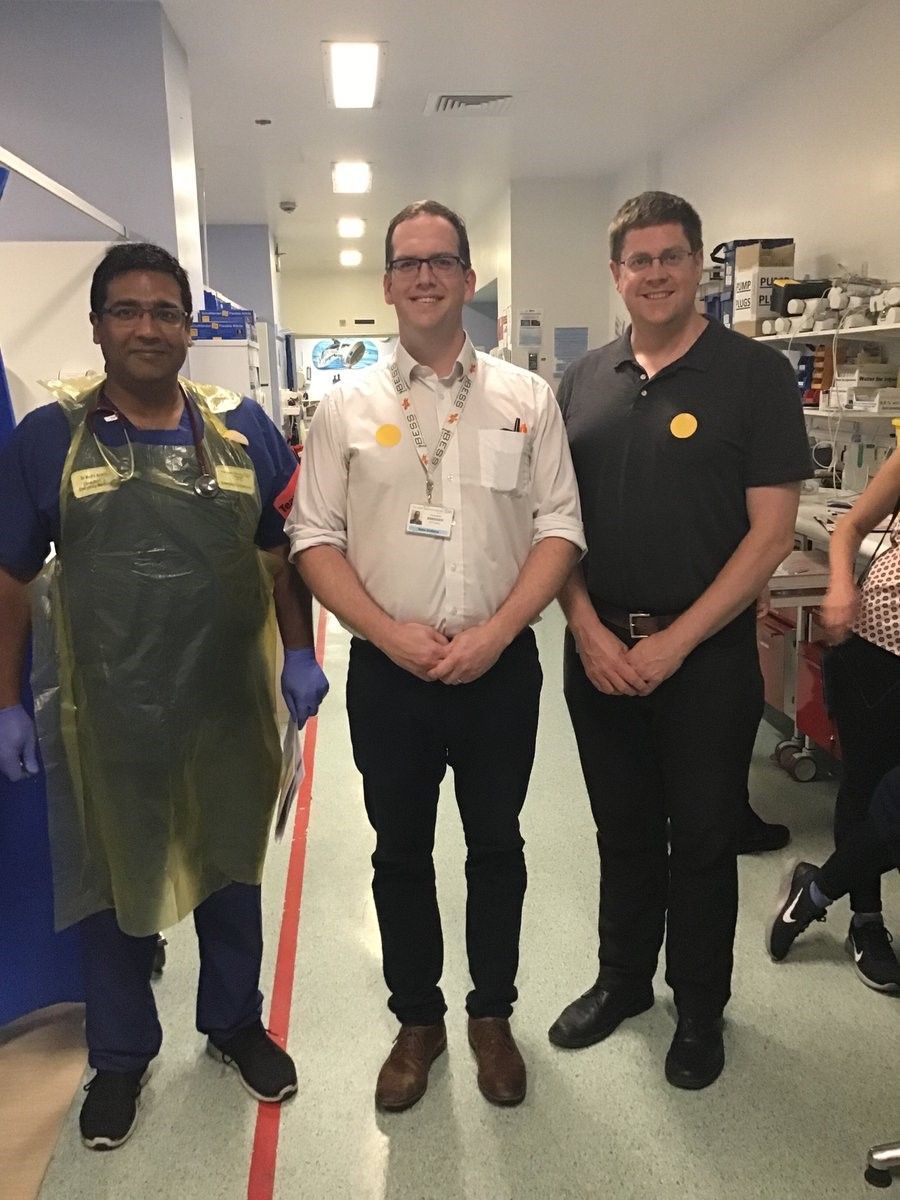
Can you share any memorable experiences or cases that have had a significant impact on your career?
Sadly, most of the memorable cases that have a significant impact on your career are the ones that don’t go quite to plan. Every surgeon has a few of those in their career and we remember them well since we journey with the patients in their complications and their suffering. No surgeon wants to see their patients suffer as ultimately, we trained in a skill that should enable patients to get better. That said, I can also think of many cases that have gone just as expected or even better than expected. One such case was a lovely little boy, Alfie, who came to see me with a deformity of his arm, and he was very unhappy with the appearance of it and felt embarrassed and sometimes got bullied at school… he felt different to his friends. He was the first of several children to undergo a CT-planned patient specific instrumentation osteotomy of his arm to correct his deformity to perfectly match the other arm. It was amazing to see him walking to clinic with an arm that was healed, that was completely straight and with a big smile on his face. The surgery had completely transformed his life. These are the cases that I remember most vividly, when you remember that smile on the child’s face or the adult who is so thankful that you’ve been able to address their disability or issue. This is contrast of the lows and highs of surgery; it is at times both the most stressful and the most rewarding way-of-life.
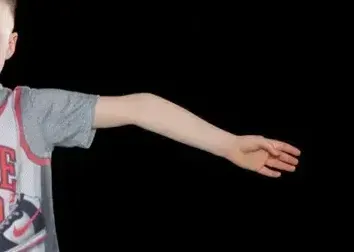
Alfie before surgery
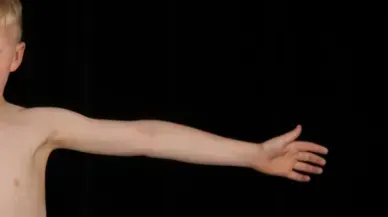
Alfie after surgery
What challenges did you face during your training, and how did you overcome them to reach your current position?
I think most challenges during training are related to learning how to behave as a senior doctor. It’s only over the last 5 to 10 years that the training systems within the UK and abroad have identified that the very best doctors undergo rigorous training in personal and professional development. In the past, we often modelled our behaviour on that of our trainers, which on occasions was less than ideal. I think my biggest challenge was working alongside and sometimes being trained by individuals who had very different values to mine. My transforming moment was when I realised that for many people in healthcare, it was just a job, NOT a way-of-life. There are many people in healthcare who do an amazing job, but they just do the job they are paid to do and no more. I always struggled with people not wanting to start early or finish late for the benefit of the patient. I now understand that personal life is incredibly important and ultimately far more important than my job. It’s a daily struggle to balance my work and personal commitments and I’m very blessed to have an incredibly understanding wife and three amazing kids that understand that I need to remain slightly flexible due to what I do. I couldn’t do what I do without them. Working within teams is fun and rewarding and it is through knowing your team that you can thrive and provide the patient with the very best outcomes.
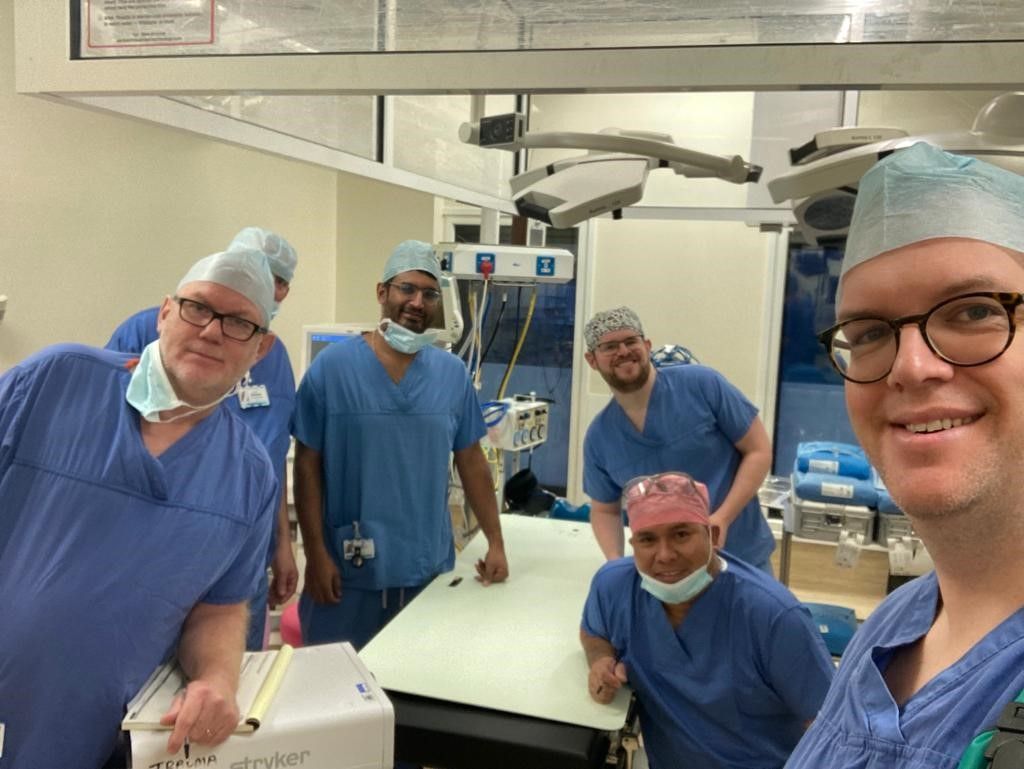
As a specialist working in a major trauma centre, what are some of the most common types of traumatic injuries you encounter?
I’m working in Leeds in the North of England in one of the busiest major trauma centres in the UK. We encounter injuries not dissimilar to many other major trauma centres across the UK. However, the volume is incredibly high. I’m lucky to be part of a great team of sub-specialist orthopaedic trauma surgeons, who take a great interest in their subspecialty. For that reason, even though I do a general on-call, the injuries that I encounter on a regular basis are predominantly those of the upper extremity. I work from the sternoclavicular joint to the wrist, so common injuries (weekly occurrence) include clavicle fractures, shoulder dislocations and fractures, humeral shaft fractures, trauma around the elbow (distal humerus fractures, terrible triad injuries, monteggias etc), not to mention the forearm and wrist fractures. We also see a fair few sports related injuries requiring surgery including acute rotator cuff tears of the shoulder, pec major ruptures and distal biceps ruptures. These are common, so with the less common and then rare injuries included, one can see the varied nature of our trauma practice.
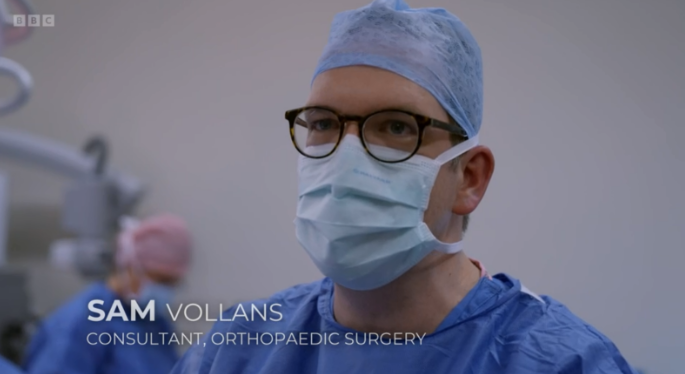
What are some unique aspects and challenges of working at a major trauma centre (MTC) compared to other healthcare settings?
Due to the volume and complexity of the work that we undertake and the huge team of multiple specialists that we can assemble, the most complex cases come our way and stay with us for the entirety of their care and follow up. This can be helpful for the patient as they have continuity of care and all their management under one roof. The difficult thing is that we often see accidents occurring in people who are travelling through our region or visiting from further afield. In these cases, we lose that continuity and multi-specialist support. We are hugely blessed in our MTC to have all specialists at our disposal, but in smaller hospitals this is not often the case and patients may have to travel between different hospitals for different aspects of their care.
The main challenge we face is balancing the urgency of our complex acute trauma surgery, and our planned less-urgent elective surgery. Due to bed pressures and limited theatre capacity, I frequently find myself having to cancel less urgent BUT equally important work, to prioritise acute trauma. When this acute trauma never stops, it makes it very hard to find the capacity to deal with planned surgery. In Leeds NHS we are lucky to have Chapel Allerton Hospital for the “not urgent” work which has more availability for this type of work. In addition, several patients choose to expedite their treatment through the private sector, and I have a relatively busy trauma and elective practice in both adults and children at the Nuffield Health Hospital in Leeds. They are very responsive to the urgency of some of the work we see in upper limb surgery. For the most complex planned non-urgent upper extremity surgery, where often two or even three consultants are required and patients want to avoid the long waiting lists, Leeds Teaching Hospitals also have self-pay packages available, which enables us to run theatres out of hours or at weekends.
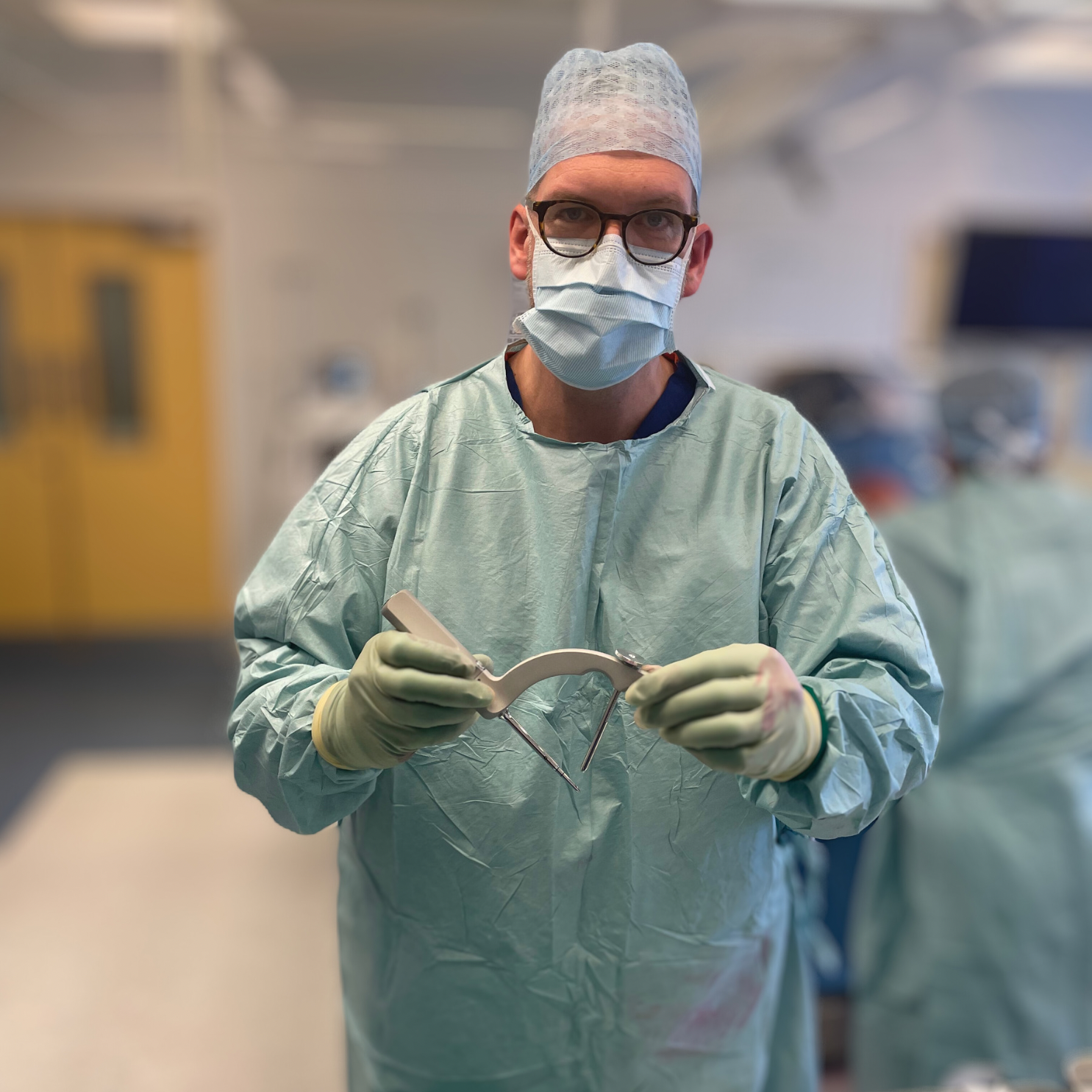
Could you tell us about your current role and responsibilities within your orthopaedic practice?
Most orthopaedic surgeons have an oncall commitment, and for me that’s with the major trauma centre. This means I take in the most critically injured patients from accidents or crime. We work very closely with vascular surgeons who really are invaluable and frequently save people’s lives from internal or external bleeding. This makes my job slightly less stressful whilst working in this role. I really enjoy and value meeting the friends and families of patients that come into hospital under my care. Communication is one of the most important things that I value with my patients and their families. We have a motto in orthopaedics which is “save life, save limb, staged reconstruction”. This explains my duties when I'm oncall; when someone comes in with a complex leg injury my job is normally the first two and then I have some fantastic colleagues who can reconstruct legs. Almost all of my reconstruction work is in the arm region.
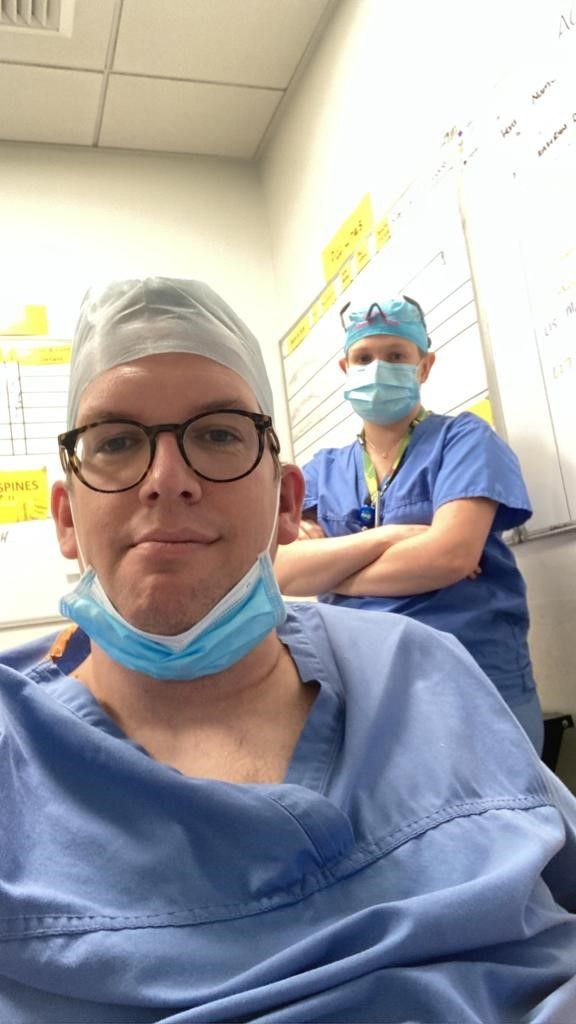
How do you address patient concerns and manage their expectations when it comes to complex procedures?
When we speak to patients about any surgery we discuss the benefits of the surgery and what we're trying to achieve to meet their expectations. For example someone might come to me with a stiff elbow and their expectation is that once i've done an operation for them their elbows should be back to normal and moving fully. The difficult thing is that often we know before we've even started that no operation will get the patient to a functional level that they're fully happy with and it's really important that we are realistic in our discussions.
Patients want a confident surgeon who knows what they can do and knows the outcome of their surgery but what they don't want is an optimistic surgeon who gives them false hope. That balance between confidence, positivity and realism is vital in the consultant-patient relationship. Following discussions about the benefits of surgery we always discuss the risks involved of such complex cases and there are many common risks that we encounter on a daily basis such as bleeding and infection but there are also rare risks that we see perhaps less than once a year such as a nerve injury. These are the risks that though rare have significant impact on the patient. It's very uncommon to encounter death as a result of planned surgery however some of the operations we do happen in Leeds within a major trauma centre because they do carry the risk of major haemorrhage and ultimately death. For example sternoclavicular joint reconstructive surgery comes with the inherent risk of major vessel injury and when performing these operations in children the risks are even higher. Once again i'm very grateful for my cardiothoracic colleagues that are always available on standby when we do these difficult operations; fortunately I've never had to call upon them from the coffee room!
The most important aspect of managing expectations is honesty and transparency. Patients really value conversations regarding unrealistic expectations and if discussed in a caring way and professional manner, they are far more likely to trust you as a surgeon. The referral practise that I have particularly in complex elbow means that I see the most complex patients from many hospitals around Yorkshire and they are often coming to me for a solution to the most difficult problems. It is not infrequent that we see problems we've never encountered before and we have to work as a multidisciplinary team to come up with a potential operative plan. We also discuss these cases nationally and internationally in various forums that we are part of.
In your experience, what are some of the most rewarding aspects of being an orthopaedic surgeon?
I think the most rewarding thing about orthopaedics which was the thing that drew me towards it is that patients come in with a clear problem and we offer them a solution and to some extent it can be a quick fix. For example I have broken my wrist and therefore I went to hospital and had it fixed and now I am better. The reality is that the majority of cases are not simple like this but to some extent a patient has pain, stiffness or instability and our aim is to make them pain-free, mobile or stable.
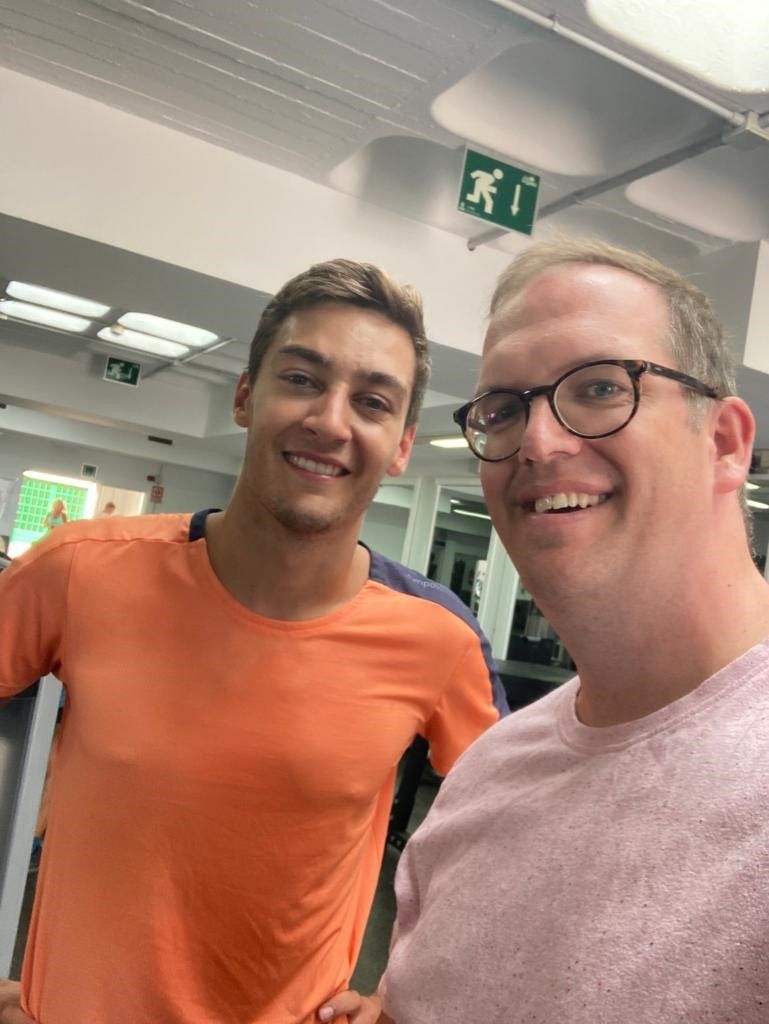
Mr. Vollans with Formula 1 driver, George Russell
How do you achieve a work-life balance while managing the demands and responsibilities of a busy surgical practice?
This is incredibly challenging and changes throughout one's career. When you start a career in surgery you often think that you're the only person that your patients can rely on and you take the weight of the world on your shoulders. The reality is that there are many great colleagues that I have that cover my back and vice versa. There are times in one's life when family and personal responsibilities need to take priority and there are also times when your colleagues need to step back from various professional commitments for the sake of work life balance. Like all surgical specialties orthopaedics is a team sport and I'm very honoured to be part of a number of great teams in Leeds.
Just because I'm a surgeon and my wife is a teaching assistant it doesn't make my role in life any more important than hers. A simple rule that I've tried to adopt is - When I've had a bad day I always assume the person I'm speaking to had a worse day. I try not to talk too much at home about my job and in a way being from a completely non medical family background and not having any medics in my family, it's a great way to avoid talking about work at home. It doesn't mean I don't ruminate on difficult cases or complications.
We understand you were the first orthopaedic surgeon involved in arm transplant surgery in the UK. That must be such an honour, but what is your role in the team?
The Leeds Hand & Arm Transplant team is huge. It consists of many plastics & nerve surgeons, nurses, occupational therapists and physiotherapists. When we decide to put a patient on the hand transplant list they have gone through a long and rigorous selection process with the aforementioned team, as well as thought process including detailed Psychology input. My role is specifically in skeletal reconstruction and on occasions functional reconstruction of the tendons, muscles and ligaments. Looking at the imaging and the patient, we come up with a clear plan of how to put the donor limbs on the recipient and must ensure that we have the right implants available to perform the surgery at the drop-of-a-hat. You are right… it is a huge honour to be involved within this prestigious team. To see patients that previously had no arms picking things up and interacting with their environment again is very moving at times.
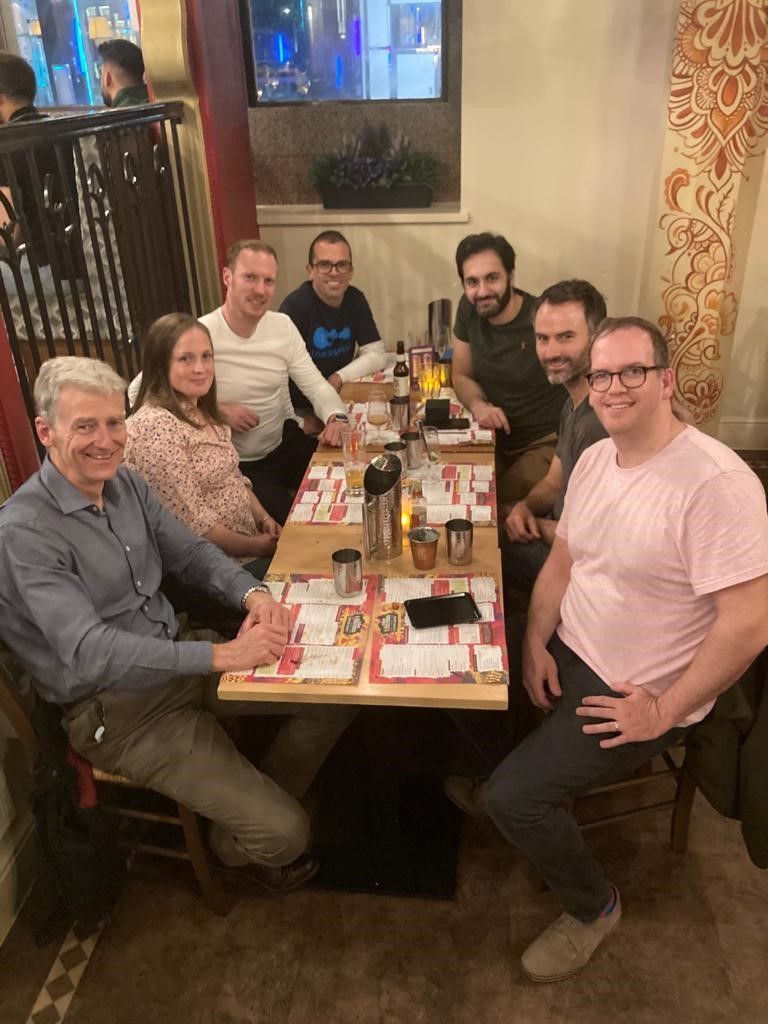
As an experienced surgeon, what advice would you give to aspiring orthopaedic surgeons who are starting their careers?
Who you are is more important than what you do! It was just before I started my consultant career in orthopaedics that I underwent some personal professional development and this revolutionised my consultant practise. Firstly, I realised that any orthopod can fix a difficult fracture; we are trained to do that and do it well. It is the way in which you handle yourself before, during and after the case that makes a surgeon world-class. Firstly, I learned that if I had the support of my team then I could conquer anything but without that, I was nothing. Most young surgeons go into consultant practise and get very excited about being the best at what they do, or perhaps bringing a different skill or surgical option to a big unit. They believe they are the leader of their team that will achieve such things. The reality is therefore that you cannot possibly lead without followers and it takes a long-time before others will follow you; it relies on trust, integrity and mutual respect.
I remember navigating this journey myself as a new consultant. I realised that I had to be able to influence those around me for the benefit of the patient. To do this, I had to know my team and understand what their drivers were. It's not good enough to tell the team they’re going to be working late for the sake of the patient… It's about involving the team in that decision, introducing them to the patient and showing them how grateful the patient would be if we were able to stay late and get their operation done. It's also about understanding the personal commitments of those within your team….. for example the nurse that you know that must leave at 5:00 PM to pick up their child from childcare. So, my advice is… know your team and know what drives them. By treating each member of your team as an integral part of it, you will gain their respect and be able to influence the way that they work for you for the benefit of the patient. This is the foundation of high performing teams… Good luck!
To read more about Mr Vollans' practice visit Shoulder2Wrist.com
To download this issue of On The Podium, click below.

Sign up to On The Podium. The latest insights and inspiration from orthopaedic specialists around the globe sent straight to your inbox.
On The Podium
The newsletter brought to you by OrthoSpaceX
| Engage with Orthopaedic Leaders | Exclusive orthopaedic insight | |
| Stay Ahead in Orthopaedic Advancements | Uncover Surgical Innovations | |
| Empower Your Orthopaedic Knowledge | Unlock the Minds of Orthopaedic Specialists |

